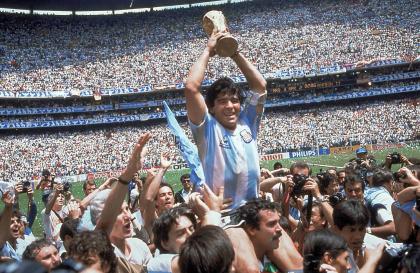The open-and-shut case for Lionel Messi being greater than Diego Maradona

Is Lionel Messi better than Diego Maradona?
Ask folks over 30 years of age, and they will reminisce over the way Maradona carried Argentina to World Cup triumph and the precision with which the diminutive Argentine dribbled passed opponents and found teammates with passes that fell out of the sky as if they had been dropped by the hand of God. The "Hand of God" goal will inevitably also come up, as will the way Maradona dribbled through the entire England team, rounded the keeper and finished his masterpiece.
[FC Yahoo: Who's better: Real Madrid's BBC or Barcelona's Three Amigos?]
Maradona's friendship with the likes of Fidel Castro, his well-documented drug habit and his flawed personality make him an interesting character beyond the sport, too.
For Argentina, Maradona edged Messi because he brought home the ultimate prize. Also, he played for Boca Juniors before going to Europe and then again at the twilight of his career. The nation treats Maradona like a deity and celebrates the joy he brought the country with the 1986 World Cup.
[FC Yahoo: The exhausting existence of Barcelona and Real Madrid]
For Argentina, Messi will always live in the shadow of Maradona because he moved to Spain at a young age. He will not truly be welcome home until he comes back with the World Cup in tow.
While Maradona may possess a far more interesting personality off the pitch and may be the darling for Argentina, Messi has surpassed Maradona on the pitch and reigns supreme in Europe. Blasphemous as it may be to say, Messi is better than Maradona.
[FC Yahoo: Luis Suarez finally sinking his teeth into the competition for Barcelona]
Surely, Maradona would have collected a Ballon d'Or or two had South Americans been considered for the award in the 1980s, but Messi's four-year stretch of Ballon d'Or awards from 2009 to 2012 offered what can best be described as magic, because even seeing it did not make it any more believable. In 2015, Messi appears on his way to regaining the award handed to the top footballer on the planet, and his recent play serves as a reminder that he is the greatest player of the modern – and possibly any – era.

Comparing accolades between the two Argentine greats is difficult, as Maradona's greatest club achievement consist of two Serie A titles and a UEFA Cup, which amounts to the modern Europa League. Messi's club achievements start with six La Liga titles and three Champions League trophies. While Maradona supporters cling to the fact that Napoli thrived in the golden age of Italian football, hasn't Barcelona done the same in the golden age of Spanish football?
[FC Yahoo: Just Messi being Messi and City being City in Barcelona's 1-0 win]
Surely, Messi's club career is more impressive than Maradona's club career. For those still not convinced, Messi has the most goals in La Liga history, most assists in La Liga history, the most European Golden Shoe awards in history, and the Guinness World Records title for most goals in a year – 91 in 2012. Messi holds about another 100 records, but even impressive records like most hat tricks in La Liga history (24) tend to become redundant after a while.
As a club footballer, Messi is the best the world has ever seen, and no one has dominated the European game, broken records and tasted glory near the same levels as the little man from Rosario.
[La Liga: Scores and Schedule | Current Standings | Teams]
Maradona and Pele played in an era where the World Cup decided greatness to a far greater extent than club play. However, the European game has developed and incorporates global talents to such an extent that the Champions League, arguably, carries more weight than winning the World Cup in the modern era.
Perhaps the best example of this shift in importance away from the World Cup is looking at the example of Cristiano Ronaldo in 2014.
After winning the Champions League with Real Madrid, Ronaldo and his Portugal side crashed out of the 2014 World Cup in the group stages, but he still managed to win the 2014 FIFA Ballon d'Or. Real Madrid did not win the Spanish Cup or the Spanish league, but Ronaldo still got credit as the world's best player. Meanwhile, Messi led Argentina to the World Cup final and won the Golden Ball, but still, Ronaldo's achievement as European club champion trumped Messi's World Cup success. Germany's World Cup winning goalkeeper, Manuel Neuer, finished third in the voting despite a domestic and international campaign for the ages.
Herein lies the problem with the Messi and Maradona debate: In Maradona's time, the World Cup meant significantly more than European club football. In the modern era of interconnectivity and global television sponsorships, European football is a global event, and the Champions League means almost as much as World Cup success. Based on the 2014 FIFA Ballon d'Or, the Champions League carried greater weight than the World Cup.
For the Messi and Maradona debate, ultimately, three Champions League trophies do not equal one World Cup trophy, but one World Cup trophy does not equal three Champions League trophies either. Messi is better than Maradona, and when the 27-year old eventually hangs up his playing boots, that won't even be a debate.
Related Video:
Shahan Ahmed is a soccer columnist for Yahoo Sports. He has previously written about the 2014 World Cup and 2013 Confederations Cup and regularly provides opinions on the English Premier League, UEFA Champions League, German Bundesliga, Italian Serie A and Spanish La Liga. Follow Shahan on Twitter: @ShahanLA and @perfectpass


